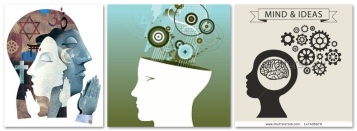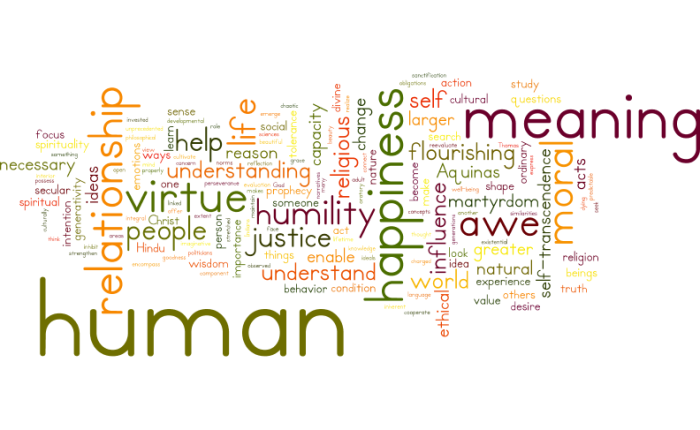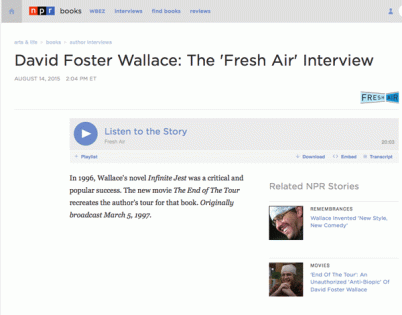
The guiding idea of our research is that virtue is the cultivation of a self-transcendent orientation that is necessary for deep happiness and a sense of meaning in one’s life. Our project constructs self-transcendence through collaborative scholarly work in 3 fields: Religious Studies & Theology, Empirical Psychology, and Philosophy.
One key innovation of our project is that rather than bringing independently conceived and executed projects into conversation at large conferences, our scholars will investigate their topics together.
Here are some of the questions many of our scholars will investigate over the course of this 28-month project:
 Religious Studies & Theology
Religious Studies & Theology
How are our ideas about what it means for Christ to become human shaped and influenced by the divine personhood of Christ?
– Michael Gorman (Catholic University of America)
What is the relationship between Aquinas’ idea of human flourishing—and its integral component of happiness—and academic enterprise?
– Reinhard Huetter (Duke University)
What is the relationship, according to Thomas Aquinas, between the virtues we acquire on our own and virtues given to us by God?
– Angela Knobel (Catholic University of America)
How does Aquinas understand the relationship between the moral emotions and justice?
– Jean Porter (Notre Dame University)
How does classical Arabic oratory influence contemporary preachers and politicians?
– Tahera Qutbuddin (University of Chicago)
Should one cultivate the virtue of humility, or is it a “weak” virtue, encouraging dependence and obedience?
– David Shatz (Yeshiva University)
How do prophecy and martyrdom focus the person on that which is greater than the self?
– Josef Stern (University of Chicago)
What is the relationship between the human moral condition and the condition of the environment?
– Mari Stuart (University of South Carolina)
Does the human search for truth also make someone open to religious questions?
– Fr. Thomas Joseph White (Pontifical Faculty of the Immaculate Conception)

Empirical Psychology
How do people understand virtue, happiness, and the meaning of life when they are stretched thin by work and family obligations?
– Marc Berman (University of Chicago)
What influence does a child’s early ideas of virtue have on the understanding of purposeful and socially just acts across her lifetime?
– Katherine Kinzler (Cornell University)
Can the so-called negative emotions actually lead us to happiness?
– Heather C. Lench (Texas A&M University)
Why are some generative narratives involving commitment to future generations culturally favored over others?
– Dan McAdams (Northwestern University)
Are we fixed adults with little capacity to change, or are we beings who can use experience to increase wisdom and human flourishing?
– Howard Nusbaum (University of Chicago)
Can we measure happiness and meaning empirically?
– Paul Wong (Emeritus, Trent University)
 Philosophy
Philosophy
What virtues shape aesthetic inspiration and the actions that follow from it?
– Talbot Brewer (University of Virginia)
What can poetry teach us about spirituality?
– David Carr (Professor Emeritus, University of Edinburgh)
Should intention factor into the way we look at those who cooperate in evil?
– Fr. Kevin Flannery (Pontifical University Gregorian)
How does happiness operate as the constitutive aim of human life?
– Jennifer A. Frey (University of South Carolina)
What are the norms inherent in the ethical study of human behavior?
– John Haldane (Baylor University and St. Andrews University)
How do the ways that we learn not to wrong someone influence our understanding of ourselves, each other, and the social context we share?
– Matthias Haase (University of Leipzig)
How does awe help us understand the human capacity for moral change?
– Kristján Kristjánsson (University of Birmingham)
How do ordinary people become virtuous, and how does virtue shape them?
– Nancy Snow (University of Oklahoma)
By fostering intensive collaboration between philosophers, religious thinkers, and psychologists, we will investigate whether self-transcendence helps to make ordinary cultivation and exercise of virtue a source of deep happiness and meaning in human life.
For more information about our scholars, and the topics they’ll discuss at our December Working Group Meetings, visit our website here.
Continue reading “23 questions our scholars are asking” →


 Religious Studies & Theology
Religious Studies & Theology
 Philosophy
Philosophy
